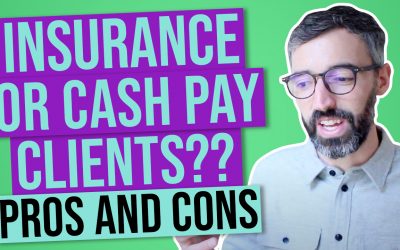So, first of all, how did I become a private practice consultant, and what gives me the right to use such a title?
Well, the short answer is: I learned a lot of things the hard way in building my first private practice in 2013 in San Francisco, and then I simply started teaching what I was learning. I didn’t wait until I had become (or felt like) a total expert in private practice. I just knew enough to start helping others–similar to becoming a therapist or counselor…
In reality, not everyone is well suited to be a private practice consultant, so what makes me different?
1. I have an affinity for learning.
This is perhaps the most critical component of being a private practice consultant. The truth is, no private practice consultant knows everything about private practice, but they know enough to get started, to be helpful, and they are willing to commit to a lifetime of continuous learning.
The private practice landscape has already changed drastically since I’ve been a consultant. For instance, there is (thankfully) less focus on old school marketing tactics like handing out business cards, networking, and open houses, but rather more focus on digital marketing. There are infinitely more tools and softwares, such as SimplePractice and Spruce, available to therapists than ever before, to make it easier to run a private practice. There are also more private practice consultants and coaches than ever before.
For the average therapist in private practice, it may be sufficient to learn just enough about business and marketing in order to grow their practice to a full-time and 6-figure capacity. That is not the case for private practice consultants. Consultants need to make every effort to not only learn about all areas of private practice (e.g., marketing, systems, hiring, scaling, legalities, etc.), but also need to commit to a never-ending state of learning and evolution. As a consultant, you must stay at least 1 step ahead of those you are helping. If you don’t know the answer to a problem, you have to be willing to go out and find it.
2. I like solving problems.
I see business as 1 big problem to solve, with many smaller problems within that bigger problem. The big “problem,” so to speak, is keeping your business profitable and alive. At the end of the day, that is your core responsibility as a business owner. When you have employees, this responsibility is of course even greater than when you are a solo practitioner.
I realized fairly on that running a business is much like “whack-a-mole,” in that once you solve one problem in a certain area of your business, another problem rears its head and demands your attention. This poses a real threat to the business owner because it tends to create overwhelm, lack of focus, and often great doubt in one’s abilities to run the business in the first place.
There is a high degree of variability in business, and you have to learn to be ok with this. Things will go wrong, it is only a matter of when, what, and to what degree. You can and should attempt to foresee and mitigate as many problems as possible throughout the course of business ownership, through systems, automation, a solid plan, and of course, receiving guidance from a private practice consultant who’s been there before.
The truth is, our ability to “see” our business is constantly limited by the fact that we are so “in it.” The solution for this is two-fold: get a lot of help running and growing your business, and take time to step back and work “on” your business rather than “in” it at least once per quarter. Consider a weekend business retreat just to focus on business development, visioning, and the mission of your business.
3. Business is in my blood.
My grandfather was an entrepreneur, and was my first example of a businessman. He had many *unrelated* businesses in his lifetime: ranging from a AAA travel agency, a driver’s education school, and a log cabin construction company. He was, of course, self-taught in business and in each of these industries.
His success in each of these businesses was, in my opinion, driven by two things: hard work and relentless learning. At the end of the day, there really is no secret to success in business.
4. I’m willing to take risks.
There is some degree of risk inherent in all business, and either you’re ok with that, or you’re not. If you’re not, you can try to become more ok with it, but if you are extremely risk-averse by nature, and unwilling to improve in this area, you have no business running a business, and that’s ok. Really–that’s ok–there is nothing wrong with being an employee of a company. Being a business owner is not for everyone.
5. I am a successful business owner.
Put simply, I have a track record for success as a business owner and entrepreneur. I grew my first practice in San Francisco to a full, 6-figure practice by generating clients entirely online, and with zero business training and very little help.
When I moved from San Francisco to Charlotte NC, I started and grew a new practice to 6-figures in less than 6 months, scaled it into a group practice, and sold the group counseling practice in April 2019.
I’ve started and grown 5 businesses in 5 years including a digital marketing agency, a virtual assistant agency for therapists, two practices, and of course, this consulting business, Private Practice Workshop.
To date, I’ve helped over 300 therapists grow their private practice, and Private Practice Workshop currently generates between $20,000-25,000 in monthly gross revenue.
What it’s like to work with me as your private practice consultant:
When I start working with a new consulting client, we always start in the same place: vision.
If you don’t have a vision for your business and life, in other words, an idea of where you want to go, then the risk is that you’ll end up somewhere completely random and unintentional. I see this happening all too often with therapists in private practice.
We start by co-creating the vision for where you want to be with your business and life in 5 years, and then reverse-engineer backward to determine what you should be focusing on this week. This ensures that every single action is directly tied to the greater vision. This also helps you answer the daily question that plagues most therapists and business owners of “what should I work on today?” and “what should I do next?”
When therapists work with me as their business consultant, there are 5 areas of focus that we address:
- Marketing
- Money
- Systems and processes
- People
- Scale
I find that when we organize our thinking into these five areas of your business, we are more focused than if we were to simply address your business more generally. It helps to know which “bucket” we’re working in at any given time. Typically, a therapist initiates consulting with me to address 1 particularly problematic area of their business, but then stick around to address the other areas. This dynamic is quite similar to that of therapy.
Each session follows the format of:
- Wins
- Challenges
- Action steps
Wins: whatever we focus on grows. When I worked at a large non-profit agency in San Francisco, helping teen clients in extremely difficult circumstances, this is what the director would tell us every single week at our staff meetings. Whatever you focus on grows. This was, and continues to be, a simple but profound concept, especially when put into regular and consistent action.
Challenges: you are responsible for bringing to each session your most pressing challenges as they relate to your bigger vision and mission. These should be big picture, strategic, or nuanced areas of your business rather than granular questions that could easily be Googled.
Action steps: I’ll write down in our coaching document the action steps that you have agreed to take between the current and next session. At the start of our next session, I’ll ask how they went and make sure that you completed them. This accountability is an important part of the consulting process.
My style:
Clients have referred to their work with me as “therapeutic business consulting,” in that we will address not only the 5 areas of your business, but how your business fits into and enhances, rather than diminishes, your life and purpose. This is where the concept of Business Made Human® came from.
In session, I will push you to get out of your own way, address mental blocks and “upper limit challenges,” take risks, earn more money, and be unapologetic in your business growth and ambitions. I will also push you to take care of yourself and build a business that is not only financially lucrative but also has true impact on making the world a better place and reducing human suffering.
What have others said about their experiences in working with me as their business consultant?
Julia Rose, LPCA
How long is the consulting process?
We meet for a minimum of 3 months at a time, meeting twice monthly for 45-minute Zoom video calls.
What is the investment?
Consulting is a significant investment and is generally reserved only for those who have completed at least 1 of my group programs such as Fully Booked, Course Creation Academy, or a Business Made Human® mastermind group. In most cases, there is a clear return on investment (ROI) as a result of consulting with me.



